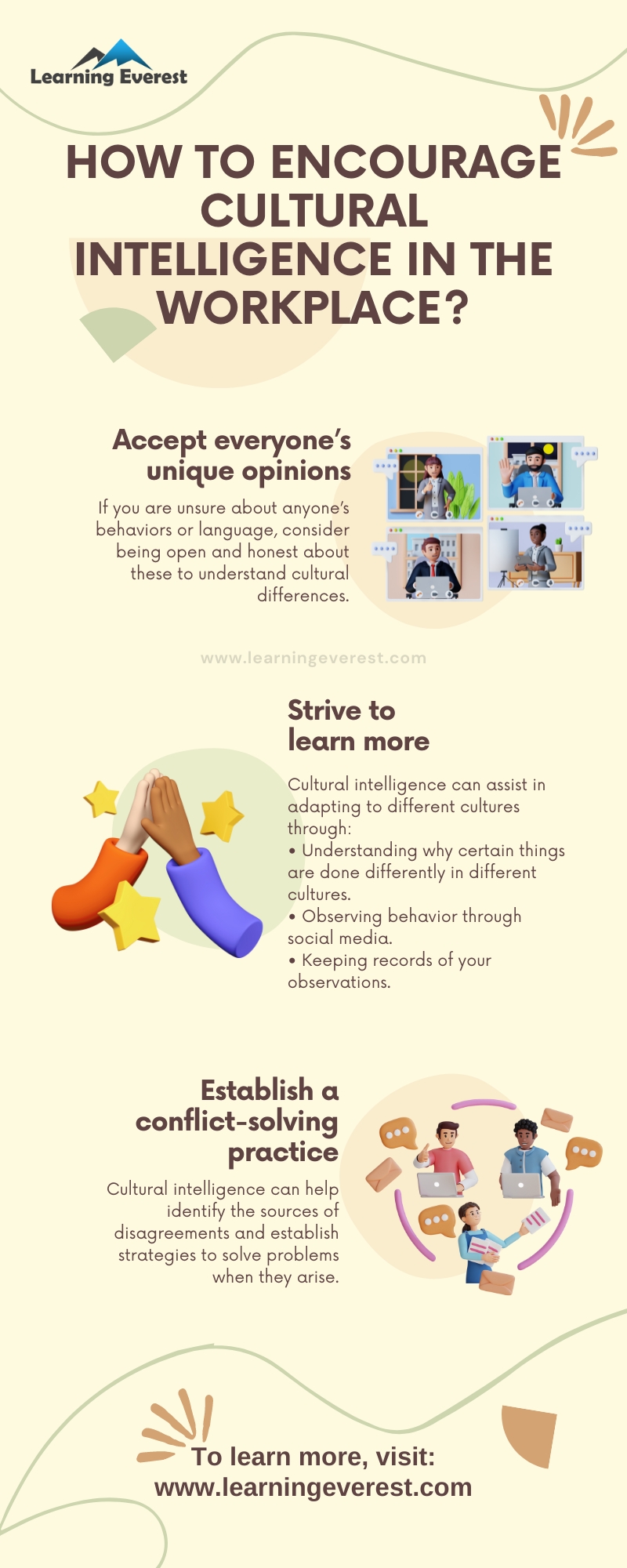Are you aware of the organizational benefits of cultural intelligence? Nowadays, organizations hire a diverse workforce. When it sounds great sitting in a diversity workshop, it becomes equally difficult when it comes to dealing with day-to-day challenges. It all comes down to the cultural intelligence, also known as the Cultural Quotient (CQ) of the employees. In this article, we discuss the key benefits of cultural intelligence.
Table of Contents
- Benefits of cultural intelligence in the workplace
- Expansion into culturally diverse markets (global or domestic)
- Inspire creativity and drive innovation
- Multicultural team effectiveness
- Increase productivity, efficiency, and acceptance of different ideas and perspectives
- An increased ability to speak and interact with culturally diverse customers
- Better leadership across the organization
- Infographic
- Frequently Asked Questions (FAQs)
- What is cultural intelligence?
- What are the three elements of cultural intelligence?
- What are the benefits of cultural diversity?
Benefits of cultural intelligence in the workplace
Cultural intelligence helps people develop an in-depth passion for learning and understanding other’s cultural backgrounds. Here are some key benefits of cultural intelligence in the workplace:
Expansion into culturally diverse markets (global or domestic)
Cultural intelligence plays a huge role in determining collaboration among people from various corporate cultures, traditions, nationalities, and cultures. Settling cultural differences can make or break your business. Moreover, Local market knowledge and insight make a business more competitive and profitable. Often, a product or service needs to succeed overseas. Understanding local laws, regulations, and customs can help a business thrive. Cultural understanding can boost international business development exponentially. Cross-cultural experience, along with local market knowledge, produces more effective marketing strategies and materials.
Inspire creativity and drive innovation
Different cultural perspectives can inspire creativity and drive innovation in the workplace. A variety of viewpoints, with the wide-ranging personal and professional experiences of a diverse team, can offer new perspectives to see the workplace and the world differently.
Multicultural team effectiveness
Developing a sense of cultural intelligence is important to deal positively with people from different cultural backgrounds. Enhancing cultural intelligence allows you to become more compassionate and sensitive to other people.
Increase productivity, efficiency, and acceptance of different ideas and perspectives
The diversity of a company’s workplace should reflect the diversity of its market – or consumers may not take that company seriously. Companies that celebrate diversity, inclusivity, and cultural sensitivity are likely to be more appealing than businesses that are perceived as inflexible and old-fashioned in their outlook. A culturally intelligent workforce will demonstrate better tolerance, trust, and understanding of global colleagues. Cultural differences become strengths in problem-solving rather than obstacles, while improved collaboration drives the ability to respond quickly to market changes.
An increased ability to speak and interact with culturally diverse customers
Culturally intelligent individual gains trust. Cultural intelligence will help individuals understand tone, body language, and context when working with people of another language. By assimilating into local culture, immersing yourself in its ways and mannerisms, and mirroring the gestures of those around you, you will appear more empathetic – provided you are genuine. You are unlikely ever to become just like the locals and think exactly like them but with an open and enquiring mind, learning to cooperate internationally can be learned.
Better leadership across the organization
Culturally sensitive leaders make better managers. They are able to better understand the dynamics of a multicultural group in a meeting, for example. They are better at negotiating with other cultures and at conflict resolution between cultures. Being culturally aware helps individuals to recognize areas of their own communication that could be improved to make their daily interaction with international colleagues more effective and more enjoyable.
By creating a diversity program, your business automatically gets a competitive edge. At Learning Everest, we can help you identify and develop a culturally intelligent workforce.
Need to know more? Drop us a comment below.
Infographic
Frequently Asked Questions (FAQs)
What is cultural intelligence?
Cultural intelligence is the ability to relate to people with culturally diverse backdrops and interact with them properly. It is important for effective workplace communication, especially in a large organization with different cultural personalities.
What are the three elements of cultural intelligence?
There are three primary components to cultural intelligence: Cognitive skills, Physical cues, and Emotional understanding.
What are the benefits of cultural diversity?
Different cultural perspectives can inspire creativity and drive innovation in the workplace. A variety of viewpoints, with the wide-ranging personal and professional experiences of a diverse team, can offer new perspectives to see the workplace and the world differently.






